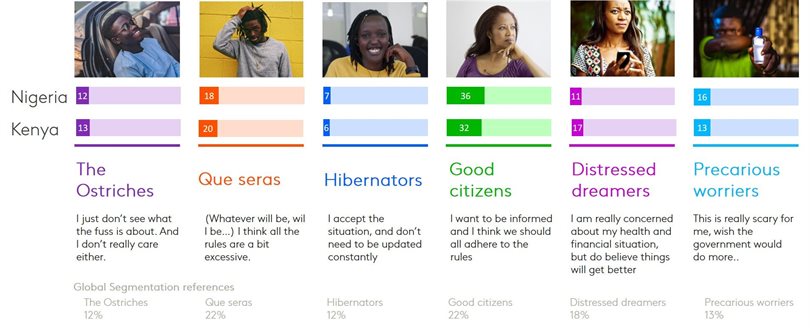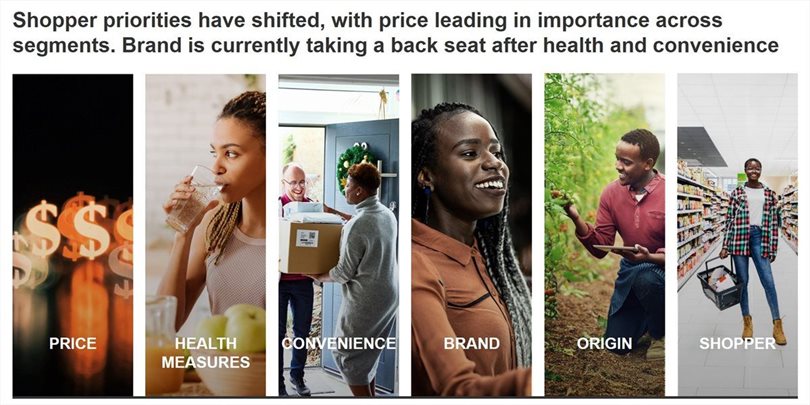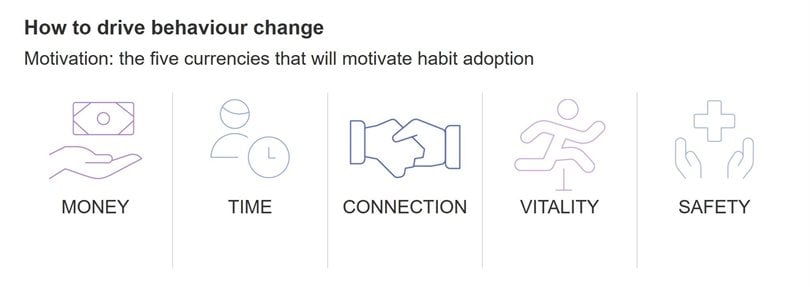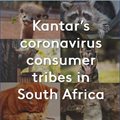Kantar’s Covid-19 tribes, an offshoot from wave six of the global Barometer study into how the pandemic affected consumer behaviour, attitudes and expectations across 60+ markets including Kenya and Nigeria, reveals what marketers need to consider to better reach consumers in these sub-Saharan markets.
Faced with crisis, individuals fall on a spectrum between ‘surviving’ and ‘thriving’, dependent on the material impact of lockdown. Because every cloud has a silver lining, today’s thrivers go beyond surviving. They’ve taken up new behaviours to better adapt to the situation, as seen with the rise of e-commerce, digital payments and at-home, online living. But that’s not all that’s changed.
The Kenyan Covid-19 context: changing shopper priorities
In Kenya specifically, there’s been a pause and rethink when it comes to making purchases. Loss of jobs and poor economic conditions have tightened wallets to such an extent that price is now the key priority driving choice consideration. Health measures and convenience also come into play for consumers, now more than brand, which was previously a key consideration.
“Looking beyond shopping, it’s time to be realistic. This focus on economy has seen Kenyans looking forward to returning to the office, but financial pressure drives that desire. In addition, end-of-year festivities are likely to be bleaker than usual because the threat of Covid-19 remains and is likely to be with us well into the new year,” says Kate Njoroge, Chief Commercial Officer, Kenya, for Kantar’s
Insights Division. This is making many hesitant to return to what’s now seen as non-essential activities, as basic needs of safety have become a top priority. So much so that in Kenya, 79% of the population have safety concerns for themselves and others compared to 46% globally.
But safety means different things to different people. While a vaccine would make good citizens and distressed dreamers feel safer, Hibernators would rather stick to the current social distancing and face mask measures and wait for the world to heal itself.
People also feel more stressed while shopping now than before the pandemic, and shopping habits have shifted, with some categories gaining and others losing as the demand for digital communication and healthy living increases. There’s also a need for normalcy and continuing the aspects of life they enjoyed pre-Covid. Brands can reactivate this by making virtual connection a priority and tapping into consumers’ desire to participate in shared challenges like dance-offs on TikTok, as they now have more time to create and not just consume content.
The Nigerian Covid-19 context: new currencies driving new behaviour
Shifting focus to Nigeria, there’s similar thriftiness underplay but it’s not all about the money. Instead, we’ve identified five currencies or motivations driving today’s new behaviours. “In each context, consumers decide whether it’s worth the currency of money, time, connection, vitality and safety, so you need to identify which currencies have a role to play and frame your brand accordingly to build meaning and relevance based on those trade-offs,” explains Ndeye Diagne, Managing Director Nigeria & Ghana for Kantar’s Insights Division.
The further something is from our current behaviours, the tougher it is to continue doing it. For example, in cultures where eating with your fingers is the norm, handwashing before and after meals is an easier habit to drive. Depending on where the behaviours for growth in your category lie, either reinforcing motivation via appropriate rewards or building meaning and therefore motivation or enhance ease factors and deprioritise behaviours that are low on motivation and difficult to adopt.
While brands initially focused on promotions as household budgets were strained, there are also opportunities around currencies of time and vitality. Some of the top tensions people are solving for today include cooking a nutritious breakfast to keep the family full until lunchtime, with enough variety that they don’t get bored. Ordering in of food has also changed. Traditionally a trade-off of time and money, in the context of Covid-19, it’s all about access to nutrition and fresh produce, which becomes a trade-off of vitality and safety, completely reframing the context based on what consumers need today.
Brands succeeding in this space have therefore seen the opportunity to reframe eating together as a family as a renewed source of pleasure in these uncertain times. They also consider consumers’ ability as the other key factor in whether behaviour change will stick or not. This is measured in terms of cultural fit, or how well the behaviour resonates intuitively or mirrors existing customs, making it easier to adopt; as well as practical ease or the ability to do so within current life routines; and the cognitive ease of the new habit, based on the amount of mental effort required to adopt the behaviour, in terms of research and processing.
Behaviour change is driven by brands striking the right balance between motivation and ability, as leveraging the right ability currencies is crucial as consumers continue to consider and adopt new behaviours. Your brand can improve the practical ease around cooking meals by offering a new meal kit service, delivering fresh ingredients in the right proportions, with a recipe. This reframes the chore of cooking as the joy of creation, with the potential for connection and vitality.
The continent’s common Covid-19 thread: how brands can activate locally
Future financial security is key across Sub-Saharan Africa, with a desire to maintain a careful balance between spending and rainy-day saving resulting in many individuals turning away from impulse purchases and instead thinking of investing, taking out insurance and starting their own businesses. This presents an opportunity for financial service providers to meet these new needs through better education and disruptive innovation, particularly for lower income groups as they are facing the highest Covid-related unemployment rates.
Consumers across all tribes increasingly expect brands to lead by example and guide the change, offering consumers practical help. So, while government needs to take the lead in ensuring citizens are safe, brands are also taking on that mantle as Maslow’s Hierarchy of Needs makes it clear that safety and security follow the most basic physiological needs of food and water for survival.
It’s important to note that safety in this new normal now means different things to different people. For some tribes, there’s greater focus on wanting more obvious hygiene measures implemented in the places they go. For others, it’s a desire for continued social distancing measures, while others are already longing for the relaxing of nationwide restrictions and for social places to fully reopen. So, pay attention to how your brand gives cues of a greater impression of safety, from ensuring your packaging is well-sealed to projecting as a service brand where people line-up with social distance marking and requiring masks and sanitising hands on entry.
Brands need to enable resourcefulness, giving consumers inspiration and new ways to connect while providing previous experiences in new ways, and facilitate meaningful interactions in a way that fits the specific tribe’s needs.
But brand strategies also need to vary in times of crisis. That’s why Covid-19 tribes can be overlaid or connected with your own data to add a powerful dimension to your messaging. For example, Kantar’s NeedScope model of consumer expectations shows there’s no single overarching expectation of brands. Instead, consumers want them to either fight and activate, strategise and plan, collaborate and accept, strengthen and lead, preserve and defend, or avert and deflect, depending on which is most authentic for your brand:
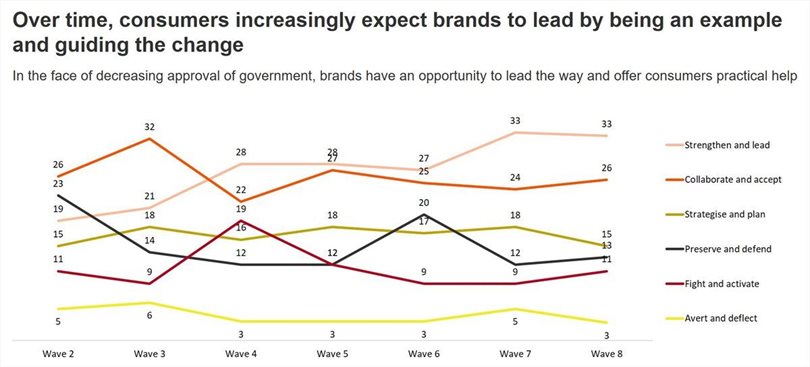
Kenya Covid-19 Barometer
click to enlarge“As your brand transverses cultures and borders, understanding your consumer tribes is of paramount importance,” says Sergey Sheykhetov, Head of Qualitative, East Africa for Kantar’s Insights Division. It’s time to identify the Covid-19 tribes and specific behaviours most likely to affect your category, as well as how new currencies of motivation and ability will influence decision-making in your category, because the silver lining of the current storm is the renewed opportunity for growth and connection with your consumers through innovation.
Take our quiz to find out which Covid-19 tribe you belong to!
Contact Kate Njoroge, Chief Commercial Officer, Kenya, on moc.ratnak@egorojN.etaK and Ndeye Diagne, Managing Director, Nigeria & Ghana on moc.ratnak@engaiD.eyedN for more on how these insights can help your brand turn the Covid-19 crisis into an opportunity.
Follow us on LinkedIn and Twitter to keep up-to-date on our latest communications.
























